As we head into another college admissions cycle, I reflect back on the number of students that I successfully helped navigate their way through a maze of college options, find their own unique best fit, and successfully submit application materials that they were confident in and proud of (that feeling of no stone left unturned, especially in the face of a competitive admissions process, is the best thing ever!).

Some students (and parents) are very aware they they are out of their depth and need additional support. Some started off pretty confident – then hit a road block and sought out help when they could not overcome it on their own. Some actually didn’t need my help – and I told them so when they consulted with me! How do you know which camp you fall into? How do you know if you need college admissions help? Here are some of the common client scenarios we’ve seen multiples of times in the past:
First generation college students. My experience? First-generation college students to be some of the hardest-working, highly-motivated students that I’ve worked with. These are very bright, academically talented kids, but neither parent has gone to, or completed, college themselves. Many students are hyper-aware that it’s on them to figure this whole college admission thing out… and feel a bit lost or disadvantaged in comparison to some of their peers.
Like most students, they need familiarity with how college admission works, what colleges are looking for, what steps they need to prepare for applying. The lack of familiarity can be wide-ranging, in my experience. For example, I’ve had a first-generation student in the past that did not realize that you could apply to more than one college. I quickly corrected the misconception – and helped him examine more closely a few college choices, so that he had options.
Also, like many students, they need help identifying best-fit college options, given their intended majors, learning styles, and various “wants” out of their college experience. (As one of my students said, “I’ve gotten so many emails and brochures. They all look like good colleges. But are they, really?”) I have specific pre-college counseling tools that I utilize to provide clarity.
Interestingly, it’s about 50/50 who reaches out for help. Sometimes, it’s the high school student themselves – and then they bring their parents on board. Equally as often, the parent is aware that their kid is can go really far, except they need to connect them with information and resources they themselves do not have, so they’ve scheduled a consultation with me.
Altogether, I’ve found that with a bit of one-on-one direction and guidance, they are able to pull everything together successfully, but they need just a bit of outside perspective and support. Sometimes, a bit of a sounding board and encouragement, as well. Being the first in your family to go to college is hard.
First timers through the college admissions process today. Major emphasis on today. Let me explain. I’ve consulted with loads of students with college-educated parents. Even multiple-degreed parents. However, college admissions then is not college admissions today. So much has changed. Year by year, little by little, the college admissions landscape changes, until it looks entirely unfamiliar. Many colleges that were “no big deal” getting accepted to in the past are now boasting record-breaking application numbers and low acceptance rates. How to navigate this issue? (Side note: The answer isn’t to just apply to a million schools on top college lists!)
For these students, they have some degree of familiarity with college admissions, applications, and even a range of college options (or, at least the parents have this level of familiarity to extend help to their kids!). But they need help zeroing in on the best fit for them. Sorting through best-fit college options, devising a college list made with sound admissions strategy, creating application materials that stand out, and sometimes, managing the huge project of applying to multiple colleges – this is what students usually need assistance with.
Out-of-state college dreams. Many people’s perceptions of “good colleges” are very much regional. I’m a native born Floridian – and I bet if I ask the average person to name a list of “good,” colleges with the best “brand recognition” locally would be at the top of the list. If I were to conduct this same informal experiment in Maryland, Massachusetts, Texas, California, or any other state, the named colleges would be very different. (Side note: I’ve also found if colleges have a nationally-recognized sports team, that tends to be an exception. Those out-of-state college are readily named!)
But what about smaller small-to-medium size liberal arts colleges? Specialized arts, music, or STEM-focused colleges? Colleges with standout academic majors and programs? With thousands of colleges and universities all over the US, identifying a great out-of-state fit may require quite a bit of research, insights, and/or assistance.
I’ve worked with quite a few of these students as well. In my home state of Florida, the Bright Futures Scholarship offers a huge financial incentives to stay in-state for college. However, every year, I have students who are eligible for the full-tuition scholarship that want to explore out of state options, many of them seeking scholarships, to even the playing field, so that their out-of-state dreams are in reach. This is another example of a common scenario that I help students navigate.
Too many colleges of interest. How many colleges should students apply to? These days, it is common for students to submit applications to 10-15 colleges, particularly if they are applying widely. Every now and then, I hear chatter about applying to 25, 30, even more colleges. This is way more colleges than I would ever personally recommend. Plus…. whew, I shudder to add up all of those application fees!
It is a common challenge to narrow down a large list of interested colleges into a streamlined best-fit list. What we do here is gather both parent and student perspectives, college experience preferences, and guide families through a process of making college list decisions from a data-centered, best-fit perspective. The end result is a tailored college application list that makes sense.
It’s Senior Year. You’re applying widely. You haven’t started yet. Believe it or not, there is quite a bit of the “pre-work” that can be started before senior year of high school. Some ideal milestones that students have reached by the time 12th grade begins:
- Fully researched college choices
- A finalized college application list of 10-12 colleges
- A detailed college application plan, including whether you will apply early action, early decision, or regular decision
- Taken the SAT or ACT at least once for a benchmark score (pick one – colleges don’t care which one you take)
- A solid draft of the Common App Essay
There’s more, but these are some of the biggies, in my opinion. More often than not, particularly if this is your first time through the process, there is an assumption that schools would take care of all there is to know. Most will cover the basics. If you have specific college admissions goals or are “stuck” with navigating a particular challenge, it’s up to families to pick up the pieces and pull everything together. Except… you have us to help.
Ideally, college preparation should begin well before senior year of high school. I love working with students who’ve gotten an early start, whether in 9th, 10th, or 11th grade, so that we can work through college planning and pre-college counseling milestones in a steady, leisurely way, avoiding the overwhelm and last-minute frenzies that happen all too often!
Let’s explore how to best help your student reach their college admissions goals! I invite you to review our current set of services and explore our testimonials for the difference we’ve made with the students we’ve worked with. Contact us today if we can be of service.
 What Is An Independent Educational Consultant?
What Is An Independent Educational Consultant? Would You Take A College Course on Jay-Z? I Would!
Would You Take A College Course on Jay-Z? I Would! UF vs FSU: Best Public College in Florida?
UF vs FSU: Best Public College in Florida? Florida Bright Futures vs Everybody: Comparing In-State and Out-of-State College Options
Florida Bright Futures vs Everybody: Comparing In-State and Out-of-State College Options